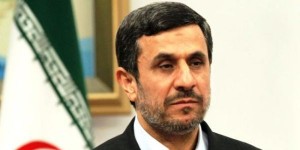 TEHRAN ó Just six weeks before Iranís presidential election, politicians and clerics have declared open season on President Mahmoud Ahmadinejad and his government, in one instance calling him a ďcowardĒ and likening him to a ďdrunk driver.Ē
TEHRAN ó Just six weeks before Iranís presidential election, politicians and clerics have declared open season on President Mahmoud Ahmadinejad and his government, in one instance calling him a ďcowardĒ and likening him to a ďdrunk driver.ĒThe invective is the latest manifestation of†infighting that broke out months ago†between Mr. Ahmadinejad and his allies and a loose coalition of clerics and Revolutionary Guards commanders.
Night after night during prime-time talk shows on state television ó under the firm control of Mr. Ahmadinejadís opponents ó critics tear into what they see as the governmentís mismanagement of the economy, blaming the president and not international sanctions for its poor performance.
In an interview this month on the countryís most watched station, Channel 3, an economist showed a bar chart intended to illustrate how Mr. Ahmadinejadís policies had led to massive job losses.
ďSurprisingly,Ē the showís host added, ďthis happened at a time of record oil revenues for Iran,Ē even though Iranís oil revenues have now fallen off because of the sanctions, imposed over Iranís disputed nuclear program.
Newspapers of all political affiliations and the semiofficial news agencies have enthusiastically joined the chorus. On Monday the Shargh newspaper published pictures of poorly attended speeches by Mr. Ahmadinejad, in near-empty stadiums. Last week, the moderate Web site Asr-e Iran published an opinion poll saying that 91.5 percent of Iranians disapproved of Mr. Ahmadinejadís economic policies.
The change in tone signals a hardening among Iranís top leadership toward Mr. Ahmadinejad, who by law cannot run for another term but who is championing the candidacy of a protťgť, Esfandiar Rahim Mashaei, in the June election. ďIt seems that there are controlled, plotted attacks against the president and his entourage,Ē said Saeed Allahbehdasthi, a political analyst. ďAnybody can talk against him now.Ē
The criticism stands in sharp contrast to 2009, when the top leadership and the security forces rallied around Mr. Ahmadinejad, whose landslide election victory was challenged as fraudulent by millions of protesters.
A well-orchestrated narrative that was spun out through state and semiofficial news media labeled anyone doubting Mr. Ahmadinejadís victory part of a ďseditionĒ aimed at toppling the Islamic Republic. Eventually, hundreds of prominent journalists, dissidents, activists and ordinary people were arrested, and many of them were tried in televised mass court cases.
But a rift opened between the former allies over the presidentís support for his aide, Mr. Mashaei. On the campaign trail, Mr. Mashaei has stressed nationalist themes rather than Islamic ones, alarming the traditionalists who oppose any revival of nationalism as a threat to their power base.
In appearances around the country, Mr. Ahmadinejad and his allies have been met with protests against Mr. Mashaei by members of paramilitary forces overseen by the Revolutionary Guards.
Last week, while visiting western Khuzestan Province, Mr. Ahmadinejad responded to the criticisms by saying that if he revealed too much, others would ďgive him hell.Ē He accused ďsome individualsĒ of exerting pressures ďin order to keep the country, its wealth and people in their hands.Ē
ďThey want us to forget about the revolutionís goals so that they can make money and become rich,Ē he said.
The remarks drew an angry response from the chief of staff of the armed forces, Gen. Hassan Firouzabadi, who said the president was ďdisturbing the minds of the people.Ē A state-run newspaper, Kayhan, dared Mr. Ahmadinejad to name those he said were involved in corrupt activities. ďThe country doesnít need a cowardly president,Ē the paperís influential editor in chief, Hossein Shariatmadari, wrote in an editorial.
But many prominent Iranians admit to worrying about the presidentís threats to reveal inner-circle secrets. ďI do not deny the fact that I really fear Ahmadinejadís Ďshall I tellsí the way one should fear and flee from a truck driven by a drunk driver,Ē a presidential candidate, Mohammad Reza Bahonar, said last week.
Although Iranís judiciary has closed over a hundred newspapers and magazines in the last decade, it has remained silent throughout the barrage of criticism of the president. The judiciary is led by Sadegh Larijani, one of five political brothers with whom Mr. Ahmadinejad has a long-running feud.
ďIt seems that security forces and the Intelligence Ministry have given media the go-ahead to damage Mr. Ahmadinejad, as they do not want his representative to enter these elections,Ē said an analyst who asked to remain anonymous because of the leadershipís sensitivity to criticism.
While Mr. Mashaei has not yet officially announced his candidacy, several clerics and former foreign ministers and intelligence officials have entered the race. On Sunday, one former president, Ali Akbar Rafsanjani, told a group of visitors that he had not ruled out running.
Candidates for the presidency must officially register with the Interior Ministry from May 7 to May 11, and then will be vetted by the Guardian Council. That group, which consists of 12 members appointed by Iranís supreme leader, Ayatollah Ali Khamenei, and the head of the judiciary will decide on May 21 who will be allowed to participate.
ďAnyone who thinks they can run can do so,Ē Ayatollah Khamenei said in a speech on Saturday. ďBut they should avoid giving baseless promises or paint a rosy picture of the issues.Ē
By The New York Times
The Iran Project is not responsible for the content of quoted articles.










